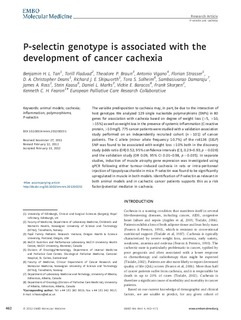P-selectin genotype is associated with the development of cancer cachexia
Tan, Benjamin HL; Fladvad, Torill; Braun, TP; Vigano, Antonio A.L.; Strasser, Florian; Deans, DAC; Skipworth, R.J.; Skeidsvoll, Tora Lång; Damaraju, S; Ross, JA; Kaasa, Stein; Marks, DL; Baracos, Vickie; Skorpen, Frank; Fearon, Kenneth C.
Journal article, Peer reviewed
Published version

Åpne
Permanent lenke
http://hdl.handle.net/11250/2622783Utgivelsesdato
2012Metadata
Vis full innførselSamlinger
Sammendrag
The variable predisposition to cachexia may, in part, be due to the interaction of host genotype. We analyzed 129 single nucleotide polymorphisms (SNPs) in 80 genes for association with cachexia based on degree of weight loss (>5, >10, >15%) as well as weight loss in the presence of systemic inflammation (C‐reactive protein, >10 mg/l). 775 cancer patients were studied with a validation association study performed on an independently recruited cohort (n = 101) of cancer patients. The C allele (minor allele frequency 10.7%) of the rs6136 (SELP) SNP was found to be associated with weight loss >10% both in the discovery study (odds ratio (OR) 0.52; 95% confidence intervals (CI), 0.29–0.93; p = 0.026) and the validation study (OR 0.09, 95% CI 0.01–0.98, p = 0.035). In separate studies, induction of muscle atrophy gene expression was investigated using qPCR following either tumour‐induced cachexia in rats or intra‐peritoneal injection of lipopolysaccharide in mice. P‐selectin was found to be significantly upregulated in muscle in both models. Identification of P‐selectin as relevant in both animal models and in cachectic cancer patients supports this as a risk factor/potential mediator in cachexia.